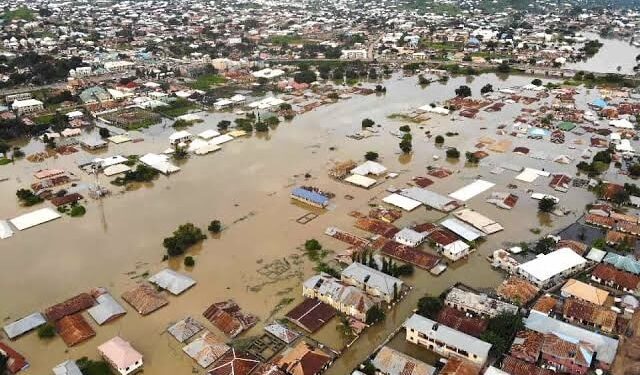Responding to a crisis can be overwhelming, often triggering a wide range of emotions and mental health challenges, such as anger, grief, anxiety, insomnia, and heightened stress.
“We shed tears while helping the people affected by the floods. I was unusually shocked. I worked for over four to five days straight, without sleep,” recalled Isa Muhammad Boboke, a volunteer with the Nigerian Red Cross Society in Maiduguri, who helped in search and rescue operations.
The devastating flood, triggered by the collapse of the Alau Dam on 10 September, wreaked havoc on the city of Maiduguri, displacing over 410,000 people and destroying homes, crops, and livelihoods.
To support the mental well-being of the Nigerian Red Cross Society (NRCS) staff and volunteers who responded to the devastating flood, the International Committee of the Red Cross (ICRC) conducted several “Help the Helpers” mental health and psychosocial support (MHPSS) sessions. These sessions focused on the importance of self-care during crises, offering strategies to manage intense emotions, cope with distress, and navigate the mental health challenges that arise. Volunteers shared their personal experiences and highlight the values of such support.
Isa’s own home was not spared from the flood. Despite his personal loss, he joined the emergency response, working tirelessly alongside other volunteers to rescue survivors and recover the bodies of those who didn’t make it.
The emotional toll of the disaster weighed heavily on him. “My mind was always preoccupied with how people were suffering. With that in mind, I couldn’t sleep and could not go on helping others,” said Isa.
During the group consultation session facilitated by the ICRC’s MHPSS team in Maiduguri, Isa and his fellow volunteers discussed ways to manage stress and protect their mental well-being while supporting others in crisis.
Reflecting on the experience, Isa shared, “there was not even a smile on my face during the operations. Now after the session, given how engaging it was, I was able to smile again. I learned how to manage the stress from the incident and can use it in future.”
“When I saw people struggling with their lives and trying to come out of the water, I asked myself how these people will cope. All their properties have been lost. I felt so emotional. I felt kind of pity for the victims,” said Rachael Yohanna, who volunteers with the NRCS’s hygiene team in Maiduguri.
What affected her most was seeing a mother whose baby had been swept away by the floodwaters. The experience left Rachael with sleepless nights. After days of witnessing such heart-wrenching scenes, she attended a “Help the Helper” session.
“It was a crucial step for me,” Rachael shared. “The session helped me realize that you have to accept what’s happened. You can’t change it, but you can learn to adapt to the situation.”
She also learned valuable coping strategies during the session. “There are things you can do to manage stress, for example, avoid unnecessary stress and unnecessary interactions, try to rest or sleep. When you are stressed and keep on doing things, you risk ending up collapsing.”
In the aftermath of the devastating flood that ravaged her community, Zainab Musa Sheriff’s heart was heavy.
“A mother lost her baby to the rushing waters. Elderly people were missing, along with others, their whereabouts unknown. Imagine not knowing where you’ll sleep, how you’ll be clothed, or when you’ll eat. You could hear the anguish in a parent’s voice as they reported their missing children, only to later find them lifeless,” recounted Zainab Musa Sheriff, a volunteer with the NRCS’s Protection of Family Links program.
Before attending a consultation session, Zainab found visiting the IDP camps overwhelming. At times, the emotional toll led to headaches and dizziness.
Through the session, she learned a vital lesson: your own well-being and safety comes first. “It’s crucial to care for ourselves before we can effectively care for others.”
“The mental health needs of helpers and frontliners are broadly like those of the people they are helping, but they are more likely to present with certain needs by virtue of their assistance work in very challenging circumstances,” said Islam Jamil Alaraj, MHPSS health programme manager for ICRC in Nigeria.
“Some of the common concerns presented are related to stress that goes beyond daily stressors,” she added. Thus, MHPSS support to staff and volunteers empowers them in their role, as well as improving the quality of their work by equipping them with tools to enable them to take care of themselves and communicate better with the affected people they are working with.






